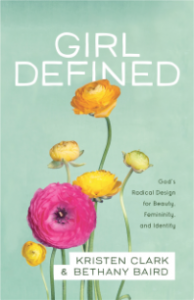
Which college should I attend?
Who should be my best friend?
When is it ok to date?
If you are like me, you have wrestled with questions like these. As we navigate through the path of young womanhood, how do we determine God’s will for the various questions that life presents?
God has given us His word so that we can understand His will for our lives.
Using scripture, let’s first debunk some biblical misinterpretations about different methods that are sometimes used by sincere Christians to determine God’s will. Then we’ll look at scriptural truth that we can know about God’s will.
Three Misinterpretations About God’s Will:
1. The Still, Small Voice Method
“When I took that campus tour, I heard a still, small voice saying that this is where God wants me to go to college.”
A common method is claiming to hear God speak. This phrase “still, small voice” is taken from the story of Elijah.
1 Kings 19:11-13 talks about Elijah hearing a still, small voice. The problem with using this method is that the voice was not Elijah’s own thoughts. The voice was not a feeling or an inclination. God spoke audibly to his prophet for a purpose.
Where has God revealed Himself to us today?
In His word. Are we supposed to be receiving extra revelation in our heads, dreams, or feelings? Rev 22:18-19 says that there are severe consequences when we add to God’s word.
The point of this passage is to demonstrate God’s presence and power to Elijah–not to show us how to determine God’s will.
2. The Inner Peace Method
“I may not agree with a lot of her choices, but I feel at peace about being her best friend.”
Sometimes we’re tempted to rely on a feeling of peace to determine God’s will. Philippians 4:6-7 says not to be anxious but to share our desires with God.
If we do that, God says that His peace will guard our hearts and mind in a way that is beyond comprehension.
Paul, the author of Colossians, is talking about how we interact with God. Let’s be careful, however, not to misinterpret this passage. Feelings are tricky and unreliable. Scripture says that the heart is prone to deceive us and is hard to understand (Jeremiah 17:9). After all, it is possible to have peace about doing the wrong thing and to be in turmoil about doing what is right (Romans 7).
The emphasis in Philippians 4:6-7 is that God’s gift of peace is the direct result of casting our anxieties and requests upon Him. It does not state that feeling peace itself is necessarily a green light guarantee for decision-making.
3. The Open Door Method
“It’s God’s will for us to date because He opened the door for us to meet at the conference.”
It’s common for Christians to determine God’s will by watching for open doors. In the following verses, Paul talks about God “opening doors” for ministry purposes.
In their context, these verses are not about being in or out of the will of God.
In contrast, they are all about being free to make choices! For example, in 2 Corinthians 2:12-13, Paul says that even though God gave him an “open door” to minister at Troas, he made the decision instead to travel on to Macedonia.
In all of these passages, Paul views the open doors as opportunities to take or not take. Scripture is clear that an opportunity does not necessarily equal the will of God (Esther 4:13-14).
Now that we’ve uncovered some myths, what CAN we know about God’s will?
Three Truths About God’s Will:
1. First, know that God has a sovereign will.
Nothing we do can thwart God’s will to fulfill the prophecies that He’s written in His word.
2. God also has a moral will.
These are direct commands: do not steal, do not lie, do not pursue sexual intimacy outside of marriage, etc. God’s moral will is for our ultimate joy and His glory. When we disobey these precepts, we position ourselves outside of the circumference of His will for our lives.
3. God’s will is for us to be wise (Proverbs 3).
Other than God’s sovereign and moral will, scripture doesn’t lay out a lot of restrictions on our freedom to make decisions. We are instructed, however, to make wise decisions. Wisdom includes things like learning from personal experience, seeking godly mentors, and using our God-given ability to think responsibly. God also says that being immersed in His word makes us wise.
So the next time we are uncertain about a decision, let’s ask these questions:
-Is this purposeful in light of God’s sovereign will?
-Is this within God’s moral will?
-Is this wise?
My prayer is that you navigate boldly for God, not with a spirit of fear but with the spirit of “power and love and self-control” (2 Timothy 1:7).
I’d love to hear your thoughts!
- What is a significant decision that you’re facing right now?
- Have one of the three questionable methods ever led you in a negative direction?
- Do these three truths about God’s will leave you with a clearer, more hopeful understanding of how to make important decisions?
Get to know the author, Liz Wickham: I am a young wife living in San Diego, CA with my vivacious, hard-working husband Richard. I am delighted to join the Girl Defined writing team! I love mentoring young women, spurring them on to love and good works for the sake of Christ. God’s gift of music is a never-ending source of joy that I delight to explore. Between choir, piano teaching, and singing…there is always a song for every occasion. My other hobbies include oil painting, decorating, home-making, swing-dancing, cooking, and walking around new places with my husband. Jesus Christ is my Savior, the Anchor of my soul. It is my goal to redeem the time spent in this life by allowing God to bless others through me.




